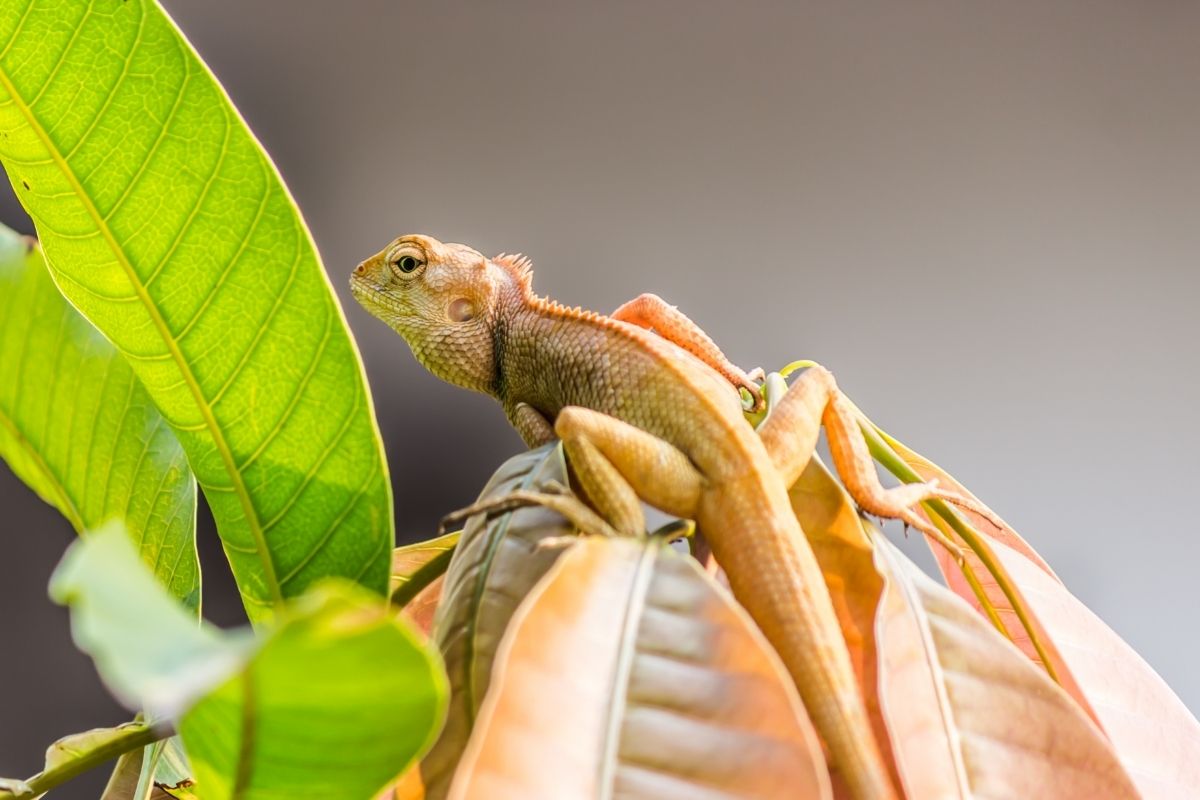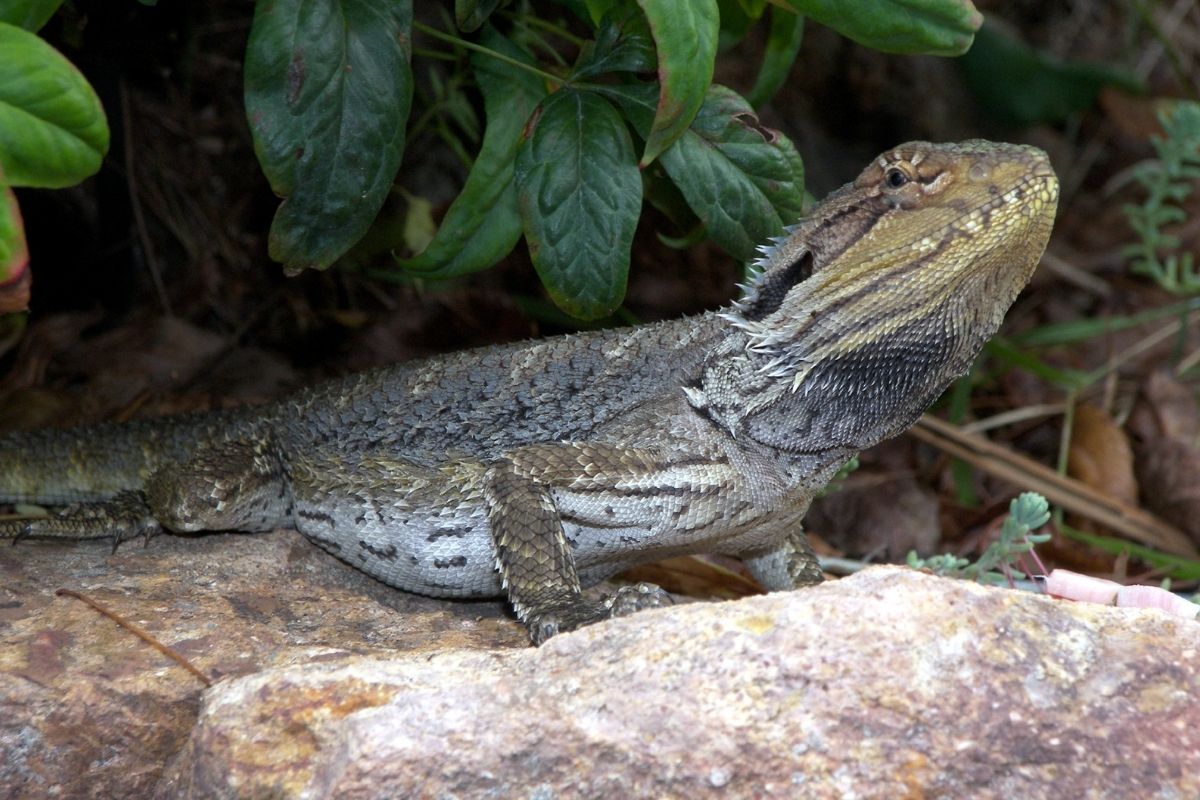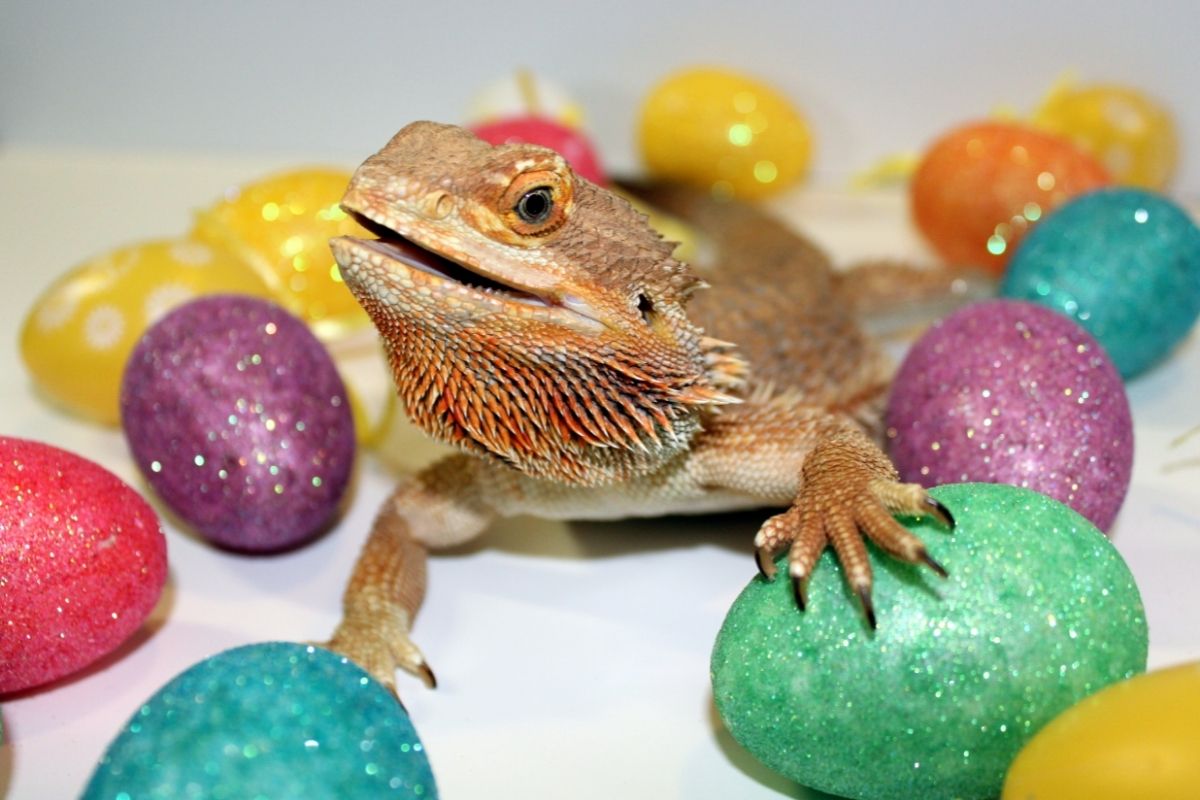Bearded dragons are some of the cutest pets around. They come in a variety of colors and sizes, and they are very friendly creatures.
Bearded dragons are reptiles belonging to the family Agamidae. They are native to Australia and New Guinea, and their scientific name is Pogona vitticeps.
The average size of a bearded dragon is about 15 inches long, and they weigh between 2 and 4 pounds. Their diet consists mainly of insects.

Bearded dragons make great pets. They don’t require much maintenance, and they can live for up to 20 years if treated well.
However, like any other pet, bearding dragons need proper care and feeding. If you want your bearded dragon to stay healthy and happy, then it is important that you provide them with appropriate food and water.
It is also essential to keep an eye on your bearded dragon so that you can prevent potential problems from occurring.
One of the most common issues faced by bearded dragons is lethargy. Many people assume that this is caused by stress or anxiety,
but it could actually have something else behind it. In fact, there are several reasons why beards might become lethargic.
But before we look at what could be causing your bearded dragon to become lethargic, let us look at what lethargy might look like in these reptiles.
How To Tell Your Bearded Dragon Is Lethargic
Lethargy is characterized by a lack of activity, which means that your bearded dragon will not move as often as normal.
It doesn’t eat or drink more than usual, and it may even appear listless. Some animals who experience lethargy do not show signs until later stages, such as convulsions.
You should take action immediately if you notice changes in your bearded dragon’s behavior.
You can tell if your bearded dragon has been experiencing lethargy if he shows signs of exhaustion. He may lie down for longer periods of time without moving, and he may stop eating for a while.
These symptoms indicate that your bearded dragon needs immediate medical attention.
If your bearded dragon is showing any of the above signs, then you should contact your veterinarian right away.
A vet can perform tests to determine what is wrong with your bearded dragon, and they will give him the correct treatment.
Now that we know a bit about what lethargy might look like in a bearded dragon, we can finally take a look at what could be causing it in our scaly friends.
So, let’s take a look at the most common reasons that bearded dragons might become lethargic.
Most Common Causes Of Lethargy
There are many reasons a bearded dragon might become lethargic. Below are the most common reasons this might happen to your lizard friend.
The Temperature Is Too Low
If the temperature outside is below 50 degrees Fahrenheit, then chances are that your bearded dragon will not feel as lively as usual.
Even though they appear active, these lizards may seem sluggish because they are cold.
When the weather gets colder, beards tend to huddle together under a heat source, such as a heater or radiator.
Their Environment Might Not Be Suitable
Your bearded dragon needs to have a suitable environment. For example, their tank might be too small, or the lighting conditions might not be ideal for them.
These factors can cause your bearded dragon to become lethargic. You can help alleviate this issue by providing them with a larger enclosure, better lighting, and more space.
Their Diet Might Not Be Suitable
Some bearded dragons get lethargic when their diets aren’t exactly what they should be. For instance, some bearded dragons may experience diarrhea if they consume foods that contain high levels of fiber.
Fiber-rich foods include grasses, leaves, and hay. Additionally, they may develop diarrhea if they eat foods that are low in protein.

Protein-rich foods include meat, eggs, and fish. If you notice that your bearded dragon has diarrhea, then you should switch its diet.
They Might Be Sick
Another reason that bearded dragons may develop lethargy is an illness. Illness can range anywhere from mild to severe, depending on what type of disease your lizard friend suffers from.
Some illnesses have no symptoms, while others do. If your beard starts showing signs of sickness, then you should seek medical attention immediately.
They Might Have Parasites
Parasitic infections are one of the most common causes of lethargy in bearded dragons. Parasites are microscopic organisms that can affect both humans and animals.
Most reptiles are susceptible to parasitic infections, but only a few types of parasites are harmful to bearded dragons. One of the most dangerous types of parasites for beards is roundworms.
Roundworm infections usually result in diarrhea, which can lead to dehydration and weight loss.
They Might Be Dehydrated
Dehydration is another reason that bearded dragons can start feeling lethargic. They may lose water through excessive urination or breathing out moist air.
If you see your bearded dragon drinking excessively, then you should provide him with additional supplies.
If you think that your bearded dragon is dehydrated, then you should add some fresh water to his enclosure.
While it’s important to make sure that your lizard buddy has access to enough water, don’t let him drink all of it at once. Instead, give him just enough so he doesn’t have to urinate frequently.
They Might Be Stressed
Stress is also a potential reason why your bearded dragon could become lethargic. Stress can be caused by several things, including overcrowding, lack of exercise, and inadequate light exposure.
If you find yourself wondering whether your bearded dragon is stressed, then you should pay close attention to how he acts during the day and night.
If he seems agitated, then he probably isn’t getting enough time outside his habitat. A good way to decrease stress in your bearded dragon is to provide him with an adequate amount of space.
They Might Start Brumation
Lethargy can also be a symptom of brumation. Brumation happens when your reptile becomes inactive during the winter months.
Although bearded dragons typically hibernate during winter, they still need to maintain a healthy lifestyle. Wintertime temperatures can drop below freezing, making it difficult for them to keep warm.
As a result, they may go into brumation. When this occurs, your bearded dragon will stop eating and sleeping.

In order to prevent your lizard buddies from entering brumation, make sure that their habitats remain as comfortable as possible.
You can use heat lamps, electric heating pads, and other devices to help your bearded dragon stay warm.
They Might Have Hypoglycemia
Hypoglycemia is a condition where your lizard buddy’s blood sugar levels fall too low. It results in lethargy because the body begins using stored fat reserves instead of glucose.
There are two different ways to treat hypoglycemia in bearded dragons: medication and diet changes. Medications like insulin injections and oral medications can help increase your bearded dragon’s blood sugar levels.
However, if you notice that your lizard buddy’s energy drops even after taking these drugs, then you should consult with your vet about alternative treatments.
How Can You Improve Your Bearded Dragon’s Energy Levels?
If your bearded dragon starts exhibiting symptoms of lethargy, such as sluggish movement or decreased appetite, then you should take action immediately.
If you suspect that your bearded dragon is suffering from any of the above-mentioned conditions, then you should contact your veterinarian right away.
He can prescribe the proper treatment and monitor your animal’s progress. You can also speak with your local pet store owner about what you can do to improve your bearded dragon’s overall health and vitality.
In addition, you might want to try one of these helpful tips on increasing your bearded dragon’s energy levels:
The best thing to do is to keep your bearded dragon fed. Make sure you feed him twice a day.
You should give your bearded dragon plenty of opportunities to move around so that he gets some regular exercise. Try climbing, hopping, jumping, running, and playing with toys.
You should change up your bearded dragon’s feeding routine every few weeks. For example, switch out his food once per week.
Beardies thrive best on a diet that consists mostly of green vegetables. They require high amounts of Vitamin B6, which can be found in broccoli, spinach, and collards.
Try adding some fresh fruits and veggies to your bearded dragon’s diet. These foods provide essential vitamins and minerals that your bearded dragon needs to stay healthy.
Try giving your lizard buddy a daily dose of probiotics. Probiotics are beneficial bacteria that aid in digestion and overall health.
Give your bearded dragon a calcium supplement. Calcium helps build strong bones and teeth.
Do not let your bearded dragon get too hot or cold. Try keeping the temperature between 70 °F and 80 °F.
Frequently Asked Questions
In this section, we are going to answer some of your most frequently asked questions concerning bearded dragons and lethargy. So, without further ado, let us get started!
How Can You Fix Lethargy In Bearded Dragons?
Lethargy in bearded dragons can be caused by decreased blood sugar levels. Low blood sugar causes your lizards to become sluggish.
To make matters worse, they may stop eating altogether. Fortunately, there are several things you can do to remedy this problem.
First, it is important for you to know how much sugar is normal for bearded dragons. Most veterinarians recommend that your lizard buddy has a blood sugar level of at least 150 mg/dL (7.8 mmol/L).
How Can You Tell If Your Bearded Dragon Is Dehydrated?
When it comes to dehydration in bearded dragons, there are many signs that you need to look out for.
Although it is very difficult to spot dehydration in reptiles, its effects will show sooner than later.
Some early signs include lethargy, loss of appetite, lack of water intake, and excessive drooling.
If you notice any of these problems, then it is time to check whether your lizard buddy is dehydrated.
How Do You Know If Your Bearded Dragon Is Upset?
Upsets occur when your bearded dragon feels anxious or stressed. When this happens, he may exhibit all kinds of unusual behaviors. One of the most common signs of an upset beardie is increased activity.
They can also start chewing excessively and biting themselves. Other examples include scratching, pacing, and even spinning. Of course, if you see anything else, then you should contact your veterinarian immediately.
Should Bearded Dragons Feel Cold?
No, they don’t. However, they should feel warm enough on your lap. In fact, they prefer temperatures hovering right around 75° F.
Final Thoughts
Your bearded dragon is an important part of your family; therefore, you have to ensure that he stays healthy.
Taking care of your bearded dragon includes providing him with adequate nutrition. By following these tips, you can help your bearded dragon feel better and live longer.
